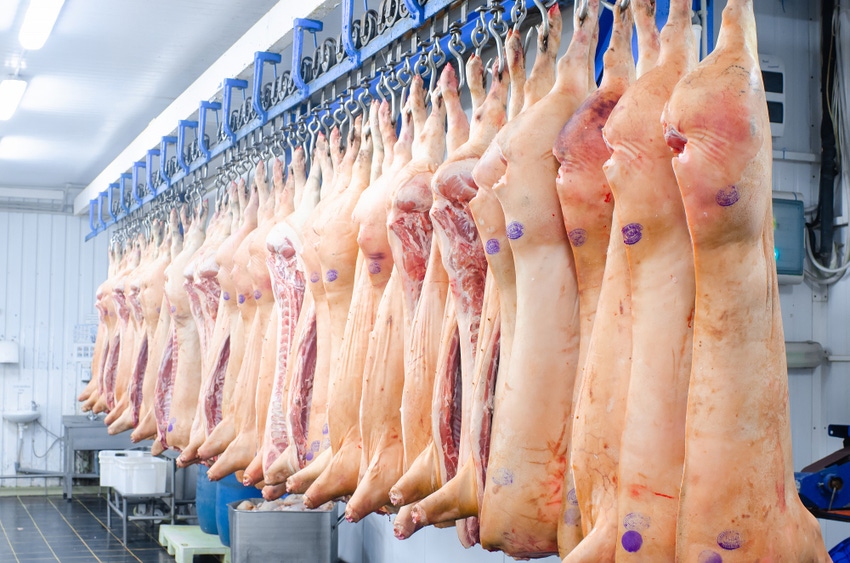Federal judge upholds New Swine Slaughter Inspection System
Court rules FSIS has adequately detailed reasons for moving from traditional system, why final rule beneficial for industry.

Several animal rights and environmental organizations have lost their challenge to a final rule addressing modernizing inspection at market hog slaughter establishments through the New Swine Inspection System. According to Chief Judge Elizabeth Wolford of the Western District of New York, the USDA Food Safety Inspection Service adoption of the NSIS was “not arbitrary and capricious” because the agency has adequately detailed reasons for plants moving from the traditional system and why this new policy is beneficial for the industry.
Plaintiffs Farm Sanctuary, Animal Equity, Legal Defense Fund, Center for Biological Diversity, Mercy for Animals, Inc., North Carolina Farmed Animal Save and Decision and Order Animal Outlook raised three arguments in their motion for summary judgement. They contended that the NSIS violates the Federal Meat Inspection Act and the Humane Methods of Slaughter Act, which require that government inspectors examine all animals before slaughter, for both animal welfare and food safety purposes. They also argued that FSIS was now handing over oversight authority to establishment employees. Finally, the plaintiffs contended that FSIS acted arbitrarily and capriciously, departing from decades-long policy and ignoring animal welfare evidence.
Published in October 2019, the voluntary NSIS requires establishment employees to perform ante-mortem and post-mortem sorting activities before federal inspection and to trim and identify defects on animal carcasses and parts before post-mortem inspection by FSIS. It also revokes maximum line speeds and allows establishments to set their own speeds based on their ability to maintain process control.
In March 2021, a court order issued by the U.S. District Court for the District of Minnesota vacated the part of the USDA final rule eliminating line speed limits for NSIS establishments. As a result, all NSIS establishments were required to operate at line speeds not exceeding 1,106 head per hour.
FSIS, in consultation with the Occupational Safety and Health Administration then developed a time-limited trial that enabled NSIS establishments to experiment with ergonomics, automation and crewing to create custom work environments that will protect food and worker safety while maintaining productivity.
In November 2021, NSIS establishments were invited to apply to participate in a trial, and six establishments were approved to run time-limited trials:
Clemens Food Group, LLC, Hatfield, Pennsylvania
Quality Pork Processors, Austin, Minnesota
Wholestone Farms Cooperative, Inc., Fremont, Nebraska
Clemens Food Group, LLC, Coldwater, Michigan
Tyson Fresh Meats, Inc., Madison, Nebraska
Swift Pork Company, Beardstown, Illinois
In response to the plaintiffs’ contention that the FSIS failed to consider the impacts of humane handling when adopting NSIS, Judge Wolford ruled it was not supported by the record. “Because Plaintiffs disagree with the adoption of the NSIS based on animal welfare concerns does not make Defendants’ adopting of the Final Rule arbitrary and capricious. It is clear to the Court that Defendants considered this issue in connection with promulgating the Final Rule, including by responding to comments raising animal welfare concerns. Defendants gave adequate explanations for the choices made, and that is all that is required.”
As for training established employees, the court noted that employees are not taking on the duties of FSIS inspectors by performing pre-inspection sorting. “Accordingly, Defendants did not ignore concerns with respect to training for establishment employees, and they provided a reasoned response as to why they did not adopt additional training,” Wolford wrote.
In her ruling regarding evidence of decreased staffing for humane handling, Wolford noted, “the Final Rule explains that this reduction in staffing would not result in a decrease in humane handling verifications, including because NSIS allows for federal inspectors to more efficiently spend their time on-site at slaughter establishments.”
Finally, relating to the plaintiffs contention that FSIS disregarded decades of prior agency positions, the judge stated the plaintiffs have a heavy burden in seeking their Administrative Procedures Act claim. “To the extent Plaintiffs argue that Defendants have failed to justify the change from the traditional inspection system to the NSIS, any such contention is not even remotely supported by the record, which is voluminous and more than sufficiently articulates the basis for the change to the NSIS, including to improve the effectiveness of swine slaughter inspection and make better use of USDA and FSIS resources.”
“The record before the Court demonstrates that Defendants considered pertinent evidence, examined the relevant factors, and articulated a satisfactory explanation when they adopted the Final Rule.”
On Nov. 28, FSIS announced it was extending the NSIS time-limited trial for up to an additional 90 days while an independent study was being designed by a team of experts. FSIS said the extension was necessary as data submitted by the swine establishments was not sufficient to evaluate the impact of increased line speeds on worker safety.
About the Author(s)
You May Also Like





